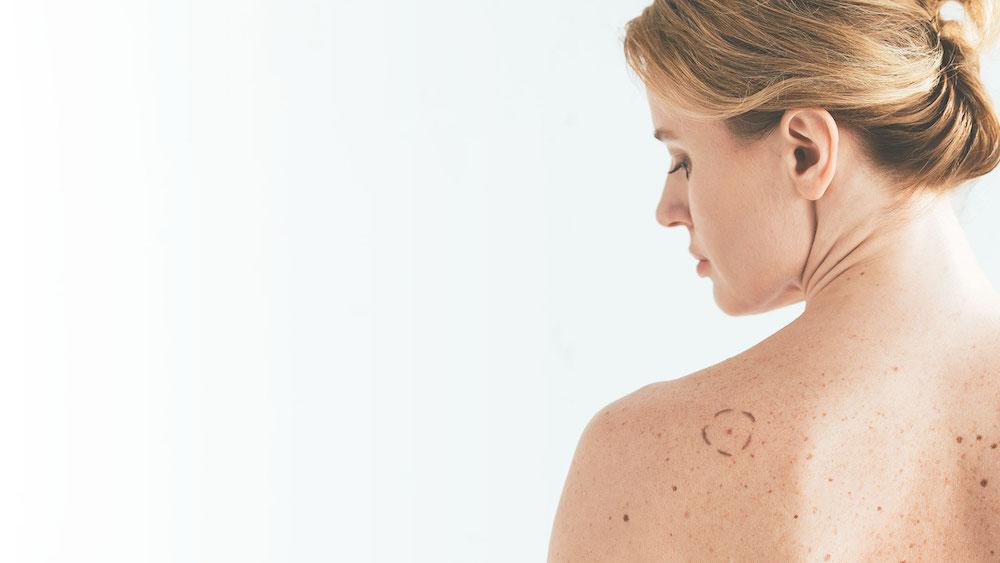The board-certified dermatologists at Millburn Laser Center are here to support not just our patients’ cosmetic dermatology needs, but also your medical skincare needs. We understand beautiful skin starts with healthy skin. We also know that each patient’s skin is unique, so our board-certified dermatologists create custom treatment plans for every person who visits our Millburn, New Jersey office. Below we’re sharing our top tips for skin cancer prevention and how to check your skin for symptoms to ensure early detection of any potential issues.
First Step: Protection
Your skin is the largest organ of your body and is the first line of defense against the outside world. While one of your skin’s jobs is to guard the rest of your body, you also need to protect your skin from influences that might harm it. By taking these precautions, you can not only safeguard against skin cancer, but also premature signs of aging like wrinkles, leathery skin, and sunspots.
Take Shade
Especially after the last year spent in quarantine, everyone will want to be outside enjoying the fresh air and outdoor activities this summer. Vitamin D is essential and healthy, but you can get a full dosage after just a few minutes outside, even in the shade. You should avoid direct sunlight during peak sunshine hours as much as possible, which is usually between 10 a.m. and 4 p.m. Even if you plan to stay in the shade while outside, always wear sunscreen.
Always Apply Sunscreen
Sunscreen is a great, easy way to protect your skin and still enjoy activities outside. It’s important that you use strong, high-quality sunscreen, especially if your skin is fair or more sensitive to sunlight. Our board-certified dermatologists can recommend the best sunscreen for you at your next appointment, or you can take a skincare assessment and purchase sunscreen on our online store. Our team recommends only the best skincare products, so you can be sure you’ll find an effective sunscreen that works well for your skin.
If you’re shopping for sunscreen elsewhere, look for products that include these descriptions, as recommended by the American Academy of Dermatology:
- Broad-spectrum, meaning it provides protection from both ultraviolet A (UVA) and ultraviolet B (UVB) rays
- SPF (sun protection factor) of 30 or higher
- Water-resistant
Add A Layer of Clothing
Summer is the time to shed clothing layers so you can swim and stay cool, but there are ways to cover up for sun protection during these warm months:
- Add a wide-brimmed hat
- Wear sunglasses to protect your eyes
- Select loose-fitting clothing (which will keep you cooler), full-coverage clothing
- Try a long-sleeved bathing suit or sun protective shirt
- Add UPF (Ultraviolet Protection Factor) clothing to your wardrobe, specifically designed to protect your skin from the sun
Next Step: Self Checks
Skin cancer can develop anywhere on your body, so it’s important that you check your entire body monthly for signs of cancerous growths. Early detection is key for ensuring more successful outcomes, not just for your health, but for cosmetic reasons as well.
What Am I Looking For?
Checking your skin for cancer/melanoma is as simple as ABCDE. Just watch for these five symptoms in moles and skin lesions:
- Asymmetry: Draw an imaginary line through the middle of any mole you find. The two halves of benign moles usually match.
- Border: Irregular, scalloped, or poorly defined borders of moles could mean the mole is cancerous.
- Color: Moles should only be one color and should not contain a broad variety of colors like tan, brown, black, red, white, or blue.
- Diameter: Non-cancerous moles are usually smaller than a pencil eraser. But cancerous moles can start small and grow larger.
- Evolving: Cancerous moles typically change in size, shape, color, elevation, or develop new symptoms such as bleeding, itching, or crusting.
How to Perform A Skin Check
You will need to disrobe and have access to a full-length mirror and a hand mirror. Start by facing the full-length mirror and look over your face (lips, nose, mouth, forehead), then your ears, neck, shoulders, chest, and stomach. Women should lift their breasts to check the skin underneath. Next, look over your arms, underarms, all around your hands and fingers, and even under your fingernails. Then turn and use the hand mirror to examine the back of your neck, shoulders, upper back, and the backs of your arms.
Now move to a seated position to look at the tops and bottoms of your feet, thighs, shins, in between your toes, and under your toenails. Stand back up and use the hand mirror again to examine your buttocks, genital area, and lower back. Finally, part your hair several times to check your scalp. A comb can help or even a hairdryer.
When to See Your Dermatologist
In addition to your monthly self-checks, you may schedule annual skin checks at our Millburn, NJ office for professional examinations by a board-certified dermatologist. If you ever find something suspicious during a monthly self-check, contact us right away for a thorough check of the suspicious area.
Learn More About Limiting Skin Cancer Risks
The board-certified dermatologists at Millburn Laser Center in Millburn, New Jersey are here as your skin experts and can answer any questions you have about skin cancer or skin cancer treatments like Mohs surgery. Contact us for more information or to schedule a consultation with a dermatologist.

